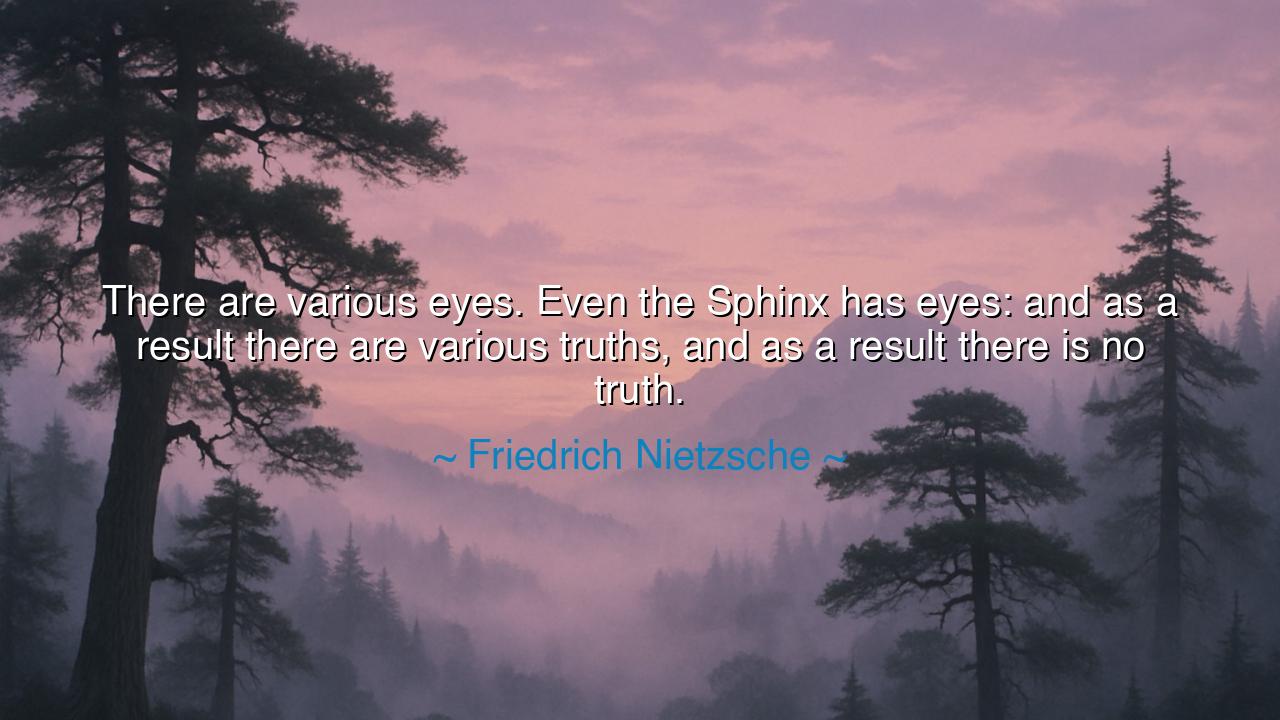
There are various eyes. Even the Sphinx has eyes: and as a
There are various eyes. Even the Sphinx has eyes: and as a result there are various truths, and as a result there is no truth.






The words of Friedrich Nietzsche—“There are various eyes. Even the Sphinx has eyes: and as a result there are various truths, and as a result there is no truth.”—thunder with the unsettling wisdom of a man who sought to strip away the illusions of certainty. In this cryptic saying, Nietzsche tells us that all perception is colored by perspective. Each pair of eyes sees differently, shaped by its history, its culture, its desires, its fears. Thus, there are many truths, each springing from a different vision of the world. And if every truth is bound to perspective, then the notion of one single, absolute Truth dissolves into mist.
The origin of these words lies in Nietzsche’s lifelong battle against dogma. He rejected the idea that there is one eternal truth handed down from heaven or written in stone. Instead, he saw a world of shifting meanings, where each observer constructs reality through their own vision. Even the Sphinx, that ancient guardian of riddles, has eyes; and her gaze, too, would create a truth of its own. This was Nietzsche’s radical teaching: that truth is not discovered in purity, but created through perception, language, and power.
The ancients understood fragments of this mystery. Protagoras declared, “Man is the measure of all things,” suggesting that reality bends to human perception. The parable of the blind men and the elephant teaches the same: each man, touching a different part of the creature, declares his truth—one says the elephant is a rope, another a wall, another a pillar. Each is right, yet none holds the whole. Nietzsche extends this lesson further, daring to say: if all truth is fractured, then the idea of a single, absolute Truth is but an illusion we create to comfort ourselves.
History offers us vivid testimony. Consider the wars of religion that swept across Europe. Each side claimed to hold the one true faith, the one true vision of reality. Yet what they saw as absolute truth was but the vision of their own eyes, conditioned by tradition and belief. The blood spilled was the price of forgetting Nietzsche’s wisdom: that there are many truths, and that insisting upon one eternal truth can blind us to the complexity of existence.
But Nietzsche’s words are not merely destructive; they are liberating. If there is no single truth, then we are free from the tyranny of those who claim to possess it. We are invited instead to engage in dialogue, to weave meaning from many perspectives, to build a world where no voice holds total dominion. Truth, in this vision, is not a monolith but a chorus—sometimes harmonious, sometimes dissonant, but always alive.
Yet this freedom also brings a challenge: without one eternal truth, how shall we live? Nietzsche answers not with despair, but with courage. If the universe does not hand us truth, then we must create it. We must live as artists, shaping meaning with our actions, our choices, and our will. The absence of absolute truth does not condemn us to chaos; it calls us to responsibility. We become, in his vision, creators of value, builders of meaning in a world where the Sphinx still gazes with many eyes.
The lesson for us is clear: do not cling blindly to one version of reality, nor dismiss the truths of others. Recognize that your eyes are not the only eyes, your truth not the only truth. Listen to others, learn from them, and let the multiplicity of truths enrich your understanding of life. At the same time, have the courage to shape your own truth, to live it boldly and authentically. For as Nietzsche teaches, there may be no final, absolute truth—but in the dance of perspectives, we may still find beauty, meaning, and strength to live heroically.






HDHannah Do
Nietzsche’s quote seems to imply that truth is not something fixed, but rather a construct shaped by different viewpoints. But if there’s no objective truth, how do we navigate important decisions or societal norms? Can we still trust facts or shared beliefs? It also raises a bigger question: if truth is different for everyone, does that mean there’s no universal standard for what’s right or wrong? How do we find consensus in a world where truth is so elusive?
TLTran Linh
Nietzsche’s idea that ‘there is no truth’ because of the multitude of perspectives is both intriguing and perplexing. Does this mean that all truths are equally valid, or is it a comment on the futility of seeking a single objective reality? If we accept that truth is fluid and subjective, how does that affect our understanding of morality or justice? It makes me wonder whether we should embrace the complexity of truth rather than seeking a singular answer.
NTha thi ngoc thao
This quote from Nietzsche feels a bit unsettling because it suggests that truth might not exist in any absolute form. If everyone has their own version of truth, how do we ever find common ground? Is it possible to reconcile these different truths, or are we doomed to endlessly debate what is ‘true’? Perhaps the idea of truth as a personal perspective challenges us to focus more on understanding others’ points of view.
DTHien Duong Thi
Nietzsche’s quote challenges the very notion of absolute truth. If there are ‘various eyes’ and ‘various truths,’ does that mean truth is subjective, shaped by our perspectives? This brings to mind the question: can we ever really know the full truth about anything, or are we limited by our own experiences and perceptions? What if our search for truth is just an ongoing journey through many different interpretations of reality?